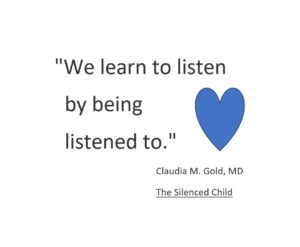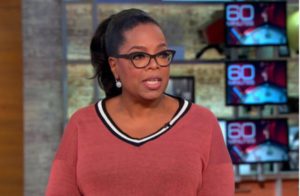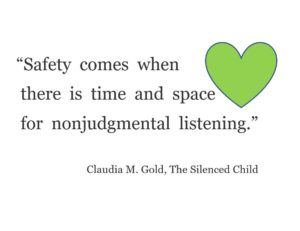Survivors OWN ACEs / 30 Days after Oprah on 60 Minutes
Day 7/6, Days 5, Day 4, Day 3, Day 2, Day 1/Intro)
Aha Day 6: Survivors, parents, and teachers OWN this conversation & post-traumatically pissed
For too long it’s been academics, clinicians and people with Ph.D.’s (mostly white dudes) talking about PTSD, adversity, healing, and health rather than trauma survivors and people who live 24/7 with traumatic stress.
Survivors have been regarded as patients almost 100% of the time by so-called “experts” rather than as people.
Let’s be clear about one thing. No one is a patient in her or her own mind. It’s not a name or an occupation. We aren’t patients in our lives.
We are 100% people.
Always as parents, professionals, partners, poets, public figures, and pastry chefs.
We are 100% people even when we are in pain.
Being treated as less in dehumanizing. It is not, as the saying goes, trauma-informed.
We the people who have post-traumatic stress symptoms and live with the impact of ACEs are disproportionately women, children, people of color, veterans, poor, and those in the LBGTQ community (so not just white dudes).
We are dealing with our trauma history and the boatload of everything else all at the same time. And yet, if and when we are talked about, it’s only as patients.

It doesn’t feel good. It’s not helpful.
It’s hurtful. It’s harmful.
Few healing approaches even acknowledge the FULL reality of our daily lives, the ones we live as being traumatized, and when doing warrior coping, surviving, thriving and being bad ass as children and adults. We know lots and have tons to share and ignoring our full experiences is a major f’n miss and shitshow mess making many post-traumatically pissed!
We’re the public and too long missing from public health and public policy discussions or the concept of us and we.
Talk of trauma has been almost entirely about “treatment” as though that’s the only important or even the most relevant thing.
We can’t put a band-aid on an elevator that’s not working, slap a “broken” or “out of use” label and refer out for the service people and ignore that the elevator is not working and the people in the building can’t get up and down.
We need to address the cause of the malfunction at the source. We need to find ways to work, parent, function while the elevator is out of order because life doesn’t stop even when things get hard.
Systems tend to define the elevator break rather and blame people who are tired and crabby from schlepping fourteen flights of stairs to bring home groceries when that gets old fast.
It’s not enough if the elevator at the treatment office works for a time. That’s not enough for all of us. Treatments tend to focus on us feeling safe, though that’s critical, and lovely when it happens. But we need to be safe and able to make a living, be free of violence or oppression, have access to jobs, support and possibilities all of the time. We need daycare, equal opportunity, and not being retraumatized by the public systems meant to serve said public. That’s more effective that conversations that “model” warmth or caring. It’s not caring to ignore what happens before and after people leave offices and conferences and how people live in different communities and zip codes.
But we do that a lot even within the trauma-informed care movement and it’s why we need trauma-informed change.
We can do more and better and start by framing talk of trauma-informed as relevant for all of us, needed by all, and not implemented or defined by only some agencies or individuals.
Trauma survivors know what trauma survivors need. We know what’s hard, what might help and what has to change. We bring intersectionalism to talk about trauma because we live in intersectional lives. We live in intersectional skin and selves. We live intersectional identities and complexities all the freakin time even outside billable hours.
Trauma survivors can’t be excluded from talk of trauma-informed care or change and all that means in all of our lives.
Does that seriously have to be said?
Sadly, yes!
Unless trauma survivors-teachers-parents are driving conversations about change, trauma-informed anything won’t make a trauma-informed difference. It will be trauma-informed bullshit, trauma-informed status quo and trauma-informed edupuking on trauma survivors. That stinks for everyone and is not just ineffective but hostile.
We need trauma-informed systems and social change to be up, down and sideways excluding no one and including everyone. We need it for all people, places, and systems and we need it yesterday.
Dr. Robert Anda, one of the two co-principals of the ACE study said the following:
“How do we package this stuff and get it to the people so they can change their relationships with their children? That’s public health. We’re not the keepers of this information.”
Survivors say yes but add that it’s about all of us and all of our children. We are all the public. Every single one of us without except. All people. All equal.

Day / Aha 7: Be with Us, Like Oprah!
Now we have Oprah!!!! Oprah is leading the way.
Oprah is personal, passionate and unapologetically emotional. Oprah is one of us, only better in terms of platform, power, popularity and deep pockets.
Oprah speaks in first-person, as a black woman who has experienced early adversity, childhood trauma, and poverty.
She doesn’t seem to worry that survivors are too stupid, scared or fragile to talk trauma (I mean, we’re trauma survivors so come on). It would be nice if others would follow her lead and not worry “for” and about us, AFTER we’ve survived trauma.
Survivors know silence, shame and denial are far more triggering, deadly, and dangerous for us. In the past. In the present. In the future. NOT community conversations, not inviting participation and collaboration.
It’s up to us to decide for ourselves if and how we wish to discuss, acknowledge and address our trauma and trauma symptoms, with whom, in how much detail and how.
If we seem reluctant to share or open up it’s not because we can’t “handle” the conversation but most often because we are worried that others can’t hold space or acknowledge the full reality of our experiences.
Most survivors find it hard to share or talk because we live in a culture that has been indifferent, absent and doesn’t listen to what we have to say about our own experiences, needs, struggles, and solutions. We fear not being heard, seen, listened to or believed.
Not our words.
Not the truth.

Please don’t try to manage the triggers and needs of others, without our input, in the name of being trauma-informed or trauma-sensitive. Just make room and space to listen to our ideas, suggestions, and even our genius because we’ve been at this our whole lives, sometimes for generation upon generation.
Quick tip: Treat all survivors like Oprah. you’d treat Oprah. With respect, with regard, without limiting people to “lived experience” or diagnostic labels.
O.k., I am sorry. I really am and I was going to edit/delete this whole post because I slipped into us and them language. AGAIN. I started feeling like there is some imaginary you that I need to fight with, do battle with and aruge/edupuke on.
I don’t want to do that. I’m working on that. EVERY DAY and sometimes EVERY MINUTE.
For so long I’ve felt like the “them” and been othered. It is hard for me to see the we and the us. It’s hard for me to trust that opening up will be wise. It’s hard for me not to rage, shut down, or feel fixed upon rather than connected to or engaged with.
And it’s not only because I have post-traumatic stress or lived through ACEs or have interpersonal issues (though… I’m not saying it’s nothing to do with those things). It’s ALSO hard for me to listen because so often survivors are ignored, minimized, and spoken for and have had to fight for every damn thing.
It’s been hard living for decades in a culture that treats injustice, pain, and suffering like symptoms of personal problems and failures rather than as social issues. It’s hard living in a culture that has then judged, blamed and punished survivors for having been traumatized.
It’s hard being in a culture that doesn’t see the whole of us and it’s something we survivors don’t always do for ourselves or others, too.
I’m not exempt from that.
For so long, I saw my pain, as just that, my own. For so long I knew nothing about domestic or interpersonal violence, or patriarchy, structural racism, sexism, historical trauma and so many other types of oppression.
And even when I learned about sexism and traumatic stress I was still mostly interested in things that helped explain my own experience to me and opposed to learning about structural racism or issues that don’t impact me as directly.
To me, learning about ACEs is one AHA, maybe the first for many of us that help us understand the world in a way wider context. But ACEs are not everything. They are an opening, an invitation for a paradigm shift.
My hope is that more people will get how early adversity strains, changes, and exhausts growing bodies, and brains – and maybe we’ll be more compassionate with ourselves and each other.
And we’ll go farther, wider, deeper so our reach is inclusive of all of ourselves and everyone.
My hope is that others will witness Oprah on 60 Minutes and see what it looks like when a survivor leads a conversation. Oprah can’t be made a token or mascot but OWNs the conversations about developmental trauma.
There’s no waiting to be allowed a seat at the table for Oprah. Oprah OWNS the set, stage and has the mic. Oprah frames the discussion. That matters as must as the words we use and the concepts we consider.
It’s one week later but I’m still flying high about watching Oprah on 60 Minutes. I’ve seen Queen Sugar and I am certain it’s only a matter of time til Oprah helps us intersect all the ways trauma, developmental, historical, and systemwide impact us all.
All of us.
“I have learned success is to be measured not so much by the position that one has reached in life as by the obstacles which (one) has overcome.” Booker T. Washington
Let’s all be successful at trauma-informed systems change – all together.
You Matter Mantras
- Trauma sucks. You don't.
- Write to express not to impress.
- It's not trauma informed if it's not informed by trauma survivors.
- Breathing isn't optional.
You Are Invited Too & To:
- Heal Write Now on Facebook
- Parenting with ACEs at the ACEsConectionNetwork
- The #FacesOfPTSD campaign.
- When I'm not post-traumatically pissed or stressed I try to Twitter, Instagram & Pinterest.
[…] 8, Day 7/6, Days 5, Day 4, Day 3, Day 2, Day 1/Intro Note: Please forgive grammar errors/typos which are […]